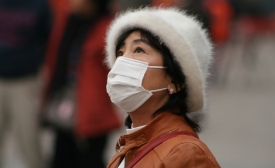climate change
Brown’s upcoming visit to Beijing will focus on keeping up the COP21 Paris accords momentum Trump wants to radically reverse. California’s aggressive stance on pollution controls and environmental standards will be highlighted. The governor wants to make a lasting difference in the world. [...] California’s interest and right to combat climate change and seek China’s support is understandable and has precedent. But what’s in it for China?
Efforts by China to forge a new global alliance on climate change and sidestep US president Donald Trump’s decision to pull out of the Paris Agreement were boosted after California governor Jerry Brown affirmed his state’s climate change alliance with Beijing. Mr Brown, governor of the state with the largest economy in the US, has been in China for a high-profile visit during which he pledged to co-operate in shaping global climate change policies and signed a deal with China to co-operate on clean technology.

Markos Kounalakis on China's attempt to gain global influence through environmental leadership and policy.
As President Trump strains alliances and relationships around the world, some of the nation’s top career diplomats are breaking publicly with him, in what amounts to a quiet revolt by a cadre of public servants known for their professional discretion. On Monday, the chargé d’affaires at the American Embassy in Beijing, David H. Rank, announced his resignation after telling his staff he could not defend the Trump administration’s decision to withdraw from the Paris climate accord.
The No. 2 diplomat at the U.S. Embassy in Beijing resigned Monday, telling staff his conscience would not permit him to formally notify the Chinese that the United States is withdrawing from the Paris climate accord. David H. Rank, a career Foreign Service officer of 27 years, had been acting ambassador until former Iowa governor Terry Branstad (R) was confirmed as the new ambassador last month. Rank held a town meeting with embassy employees to explain he had offered his resignation and it had been accepted.
The United States is resisting plans to highlight how climate change is disrupting life in the oceans at a U.N. conference of almost 200 nations next week, Sweden's deputy prime minister, who will co-chair the talks, said on Tuesday.President Donald Trump doubts that global warming has a human cause. [...] He tweeted after a Group of Seven summit in Italy on Saturday, "I will make my final decision on the Paris Accord next week!" All other G7 leaders reaffirmed strong commitment to the global deal.
"Many bilateral aid programmes to Asia have been cut by over 40 per cent and there have been complete withdrawals from some sectors such as regional health programmes in South-East Asia. There has been a lack of strategic vision in Asia so clearly demonstrated by Australia’s reduction in assistance to Myanmar as a fledgling democracy and transitioning economy. We also remain extremely concerned that the most vulnerable people living on Pacific island nations are inadequately protected from climate change,” Purcell tells SciDev.Net.
Scientists on Saturday took the unprecedented step of staging marches in more than 600 cities worldwide in the face of what they see as a growing political assault on evidence-based knowledge. Thousands of scientists and their supporters attended March for Science events in such cities as Cape Town, London, Madrid and Seoul, as well as in Australia, Brazil, Canada and Nigeria. [...] The March for Science thrusted scientists, who generally avoid advocacy and whose work is based on impartial experimentation, into a more visible spotlight.







